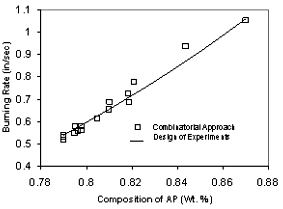![]() Functionally Graded Energetic
Materials
Functionally Graded Energetic
Materials
Prof. Hugh Bruck, Mr. Arun Kota - University of Maryland, College Park
Dr. Mitch Gallant, Dr. Suzanne Prickett, Mr. Greg Young, Mr. Mario Cesarec - Indian Head
Division, Naval Surface Warfare Center, Indian Head, MD
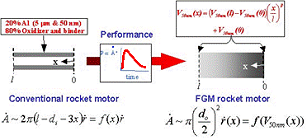 |
|
| Figure 1. Example of concept for replacing conventional rocket motors with rocket motors containing functionally graded propellants. |
This research project focuses on a new Materials by Design approach to creating energetic materials using Functionally Graded Materials (FGMs) concepts. The research is being conducted as a joint collaboration between the University of Maryland (UMD) and Indian Head-Naval Surface Warfare Center (IH-NSWC) through the Center for Energetic Concepts Development (CECD). This approach has been facilitated by previous efforts at IH-NSWC to apply a new process, known as Twin Screw Extrusion (TSE), for continuously manufacturing energetic polymer composites. It takes advantage of the continuous nature and superior mixing characteristics of the TSE process to manufacture a new concept for propellants and explosives: Functionally Graded Energetic Materials (FGEMs).
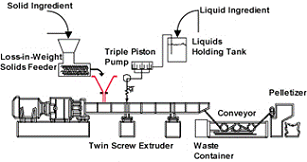 |
|
| Figure 2. Typical facility components for a twin-screw extrusion facility. |
For example, conventional geometrically-complex homogeneous grains for solid rocket motors can be replaced by a geometrically-simpler cylindrical FGEM configuration with an axial gradient in the energetic material formulation. The simpler geometry does not have the undesirable stress concentrations present in a conventional grain that end up reducing the reliability of the grain due to the formation of cracks, and the gradient in the energetic polymer composite formulation offers new possibilities to the designers of advanced energetics concepts that are not possible with the geometrically-complex homogeneous grains.
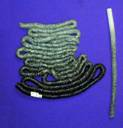 |
|
| Figure 3. Graded polymer composites manufactured using TSe process. |
Since the fabrication of graded polymer composites with either inert or energetic ingredients has never before been investigated, an objective of this research program has been to understand the fundamental scientific and technical issues involved in the processing of these novel materials focusing on graded polymer composite propellants. Of primary concern is characterizing and modeling the relationship between the extruder screw geometry, transient processing conditions, and the gradient architecture that evolves in the extruder. Recent interpretations of the Residence Time Distributions (RTDs) and Residence Volume Distributions (RVDs) for polymer composites in the TSE are used to develop new convolution process models for predicting gradient architectures in the direction of extrusion.An approach was also developed for characterizing the sections of the extrudate using optical and combustion analysis to determine the gradient architectures and associated burning rates.
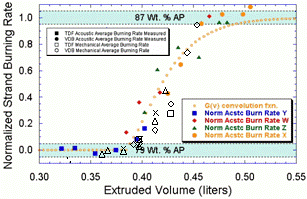 |
|
| Figure 4. The individually measured burning rates were determined as a function of location (given by volume) along the gradient. The predicted response as given by the convoluted function is plotted for comparison. |
The new process models and burning rate properties that have been characterized in this research effort will be the basis for future development of an inverse design procedure that is capable of determining gradient architectures for grains in solid rocket motors that possess tailored burning rate
distributions that conform to user-defined performance specifications. It also serves as the basis for a new combinatorial materials science approach to formulating energetic materials.
|
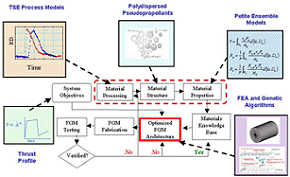 |
| Figure 5. Comparison of burning rate versus composition from new combinatorial approach with variation determined by conventional Design or Experiments. |
Figure 6. Inverse design procedure for rocket motor applications. |
Contact:
Dr. Hugh Bruck
Phone: 301.405.8711
Email: bruck@umd.edu
Website: Functionally Graded Energetics Materials Lab

